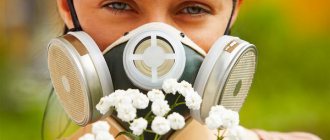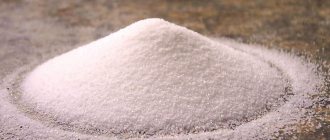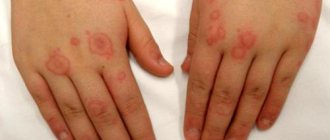Causes of an allergic reaction
The reason for allergic reactions to this product is its individual intolerance. Most often, an allergic reaction to ginger appears gradually (symptoms may appear several days after consuming ginger). Therefore, the introduction of spices into the diet should take place in several stages.
On sale you can find ginger in the following forms:
- fresh ginger root;
- ground ginger;
- pickled ginger;
- essential oil
allergies to pickled ginger separately. As you know, pickled pink ginger is a popular dish in Japanese cuisine. It can be found both in supermarkets (in packaged form) and in Japanese restaurants and sushi bars. Ginger adds a unique piquant flavor to sushi and rolls, and makes it possible to switch from one type of roll to another.
Despite all its usefulness and pleasant taste, this dish is a strong allergen. If you are hypersensitive to ginger root, an allergy to pickled ginger will definitely occur.
Cross allergy
Sometimes allergies to ginger are cross-linked. If ginger is an allergen, then there is a high chance that you will have a reaction to wormwood or mustard. At the same time, if you have an allergic reaction to mustard, you should eat ginger with great caution.
Do not try to solve the question: is it possible to use ginger if you have allergies on your own. It is quite possible that if you are allergic to wormwood pollen, you should also not eat it.
If you are not sure whether ginger is an allergen for you or not, it is better to consult with an allergist. Negative consequences are easier to prevent than to eliminate.
Allergens
There are currently no characterized allergens for this plant.
Treatment
First of all, you need to remove all dishes containing ginger from the menu. It is not a very common and vital product, so it is quite easy to refuse it. You must carefully read food labels, as well as instructions for cosmetic products. If you try to change the type of product (for example, eat it dried rather than raw), this will not affect its allergenicity.
Drug therapy
The doctor should determine the duration and recommend medications. If treatment is not started in a timely manner, the risk of more serious diseases - allergic asthma, chronic eczema, dermatitis - cannot be excluded.
- Antihistamines – Claritin, Suprastin, Clarisens, Diazolin, Zyrtec, Loratadine, etc. The average course of taking the drugs is a week and a half.
- Enterorbents that will help quickly remove the irritant from the body - Polysorb, Filtrum, Enterosgel, Lignosorb, activated carbon, etc.
- To eliminate itching and rashes - Gistan, Solcoseryl, Advantan, Belosalik, Lokoid, etc.
- To relieve swelling and ease breathing - Nazivin, Fenistil, Avamis, Vibrocil, etc.
- Eye drops – Allergodil, Cromohexal, Azelastine, Ketotifen, etc.
- For severe skin manifestations, use steroid drugs - Dexamethasone, Prednisolone.
ethnoscience
Before using traditional methods, it is advisable to consult a doctor. Their uncontrolled use can lead to exacerbation of existing allergies and deterioration of well-being.
- Pour 1 tsp of oak bark with a glass of boiling water and boil for 30 minutes. The decoction is used in the form of lotions. Baths with chamomile and sea salt will also help.
- Pour boiling water over fresh birch leaves and drink instead of tea.
- In case of severe itching, lubricate the affected areas with cabbage brine or apply fresh cabbage leaves.
- For rashes on the face 3 tbsp. dry crushed mint leaves pour 3 tbsp. boiling water, stir thoroughly. Apply the warm paste to the skin for 15 minutes.
- You can wash your eyes with chamomile decoction.
- 2 tbsp. chopped fresh celery roots, pour a glass of cool water, leave for 4 hours. Drink a third of a glass 2 times a day half an hour before meals. The course of treatment is 3 weeks.
Ginger Allergy Symptoms
According to the time of manifestation, all allergic reactions can be immediate (up to two hours) or delayed (the first manifestations of the disease may appear several days later.
Inhalation of ginger powder can also cause allergies.
Ginger allergy symptoms are classified as delayed. Manifestations of allergies include:
- Inflammation of the mucous membranes of the nose, mouth, eyes.
- Breathing disorders (sneezing, runny nose, cough, even swelling of the larynx).
- Skin manifestations (itching rashes, allergic dermatitis, eczema).
- Quincke's edema, or "giant urticaria".
- Disorders of the gastrointestinal tract (nausea, vomiting, diarrhea, bloating).
- Anaphylactic shock.
There is a possibility of occupational allergy to ginger.
These are people who work and frequently come into contact with spices (for example, in the production of gingerbread and other baked goods) and pickled ginger (Japanese cuisine).
It is not uncommon for these patients to develop contact dermatitis on their hands.
Symptoms
The reaction can be either immediate (manifests in less than 2 hours) or delayed (up to several days).
- redness of the skin, rashes, pink or reddish blisters, severe itching;
- cough, swelling of the throat, voice becomes hoarse and hoarse, tingling in the mouth;
- sneezing, copious mucus from the nose;
- lacrimation, redness of the mucous membranes of the eyes, swollen eyelids;
- stomach cramps, abdominal pain, nausea, vomiting, flatulence, diarrhea;
- in severe cases, anaphylactic shock, Quincke's edema. These are conditions that can threaten the patient's life. Urgent medical attention is required.
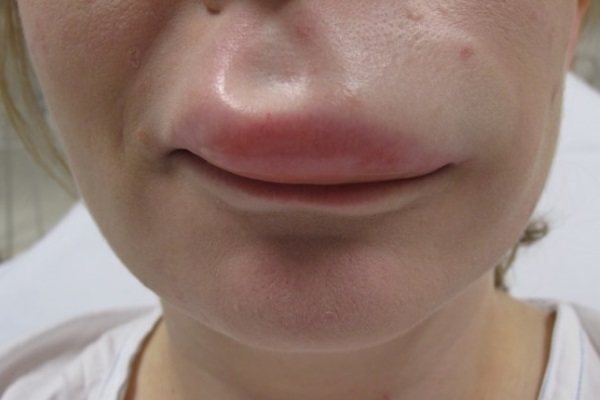
Ginger in raw and powdered form may interfere with the effects of certain medications. It enhances the effect of heart medications, thins the blood, and enhances the effect of medications with a hypoglycemic effect. In this case, symptoms may be more severe.
First aid
Antihistamines (Zyrtec, Claritin, Tavegil, diphenhydramine with calcium gluconate) will help get rid of allergies. For mild allergies, drugs based on cromoglicic acid (nasal sprays, aerosols, eye drops) are used.
If the allergy manifests itself as anaphylactic shock, first aid is as follows.
- You must immediately call an ambulance.
- Before the ambulance arrives, the patient is placed with his legs slightly elevated and given an antihistamine
- Upon arrival of the ambulance team, explain what caused the shock, what symptoms arose, what medications were given to the patient
Prevention
Preventive measures consist of one thing - completely remove this allergen from the diet. If you have an allergy, ginger cannot be consumed in any form: neither dried, nor fresh, nor pickled. There is a taboo even on dishes that contain even a little of this spice. Moreover, when purchasing cosmetics and care products, as well as perfumes and wet wipes, it is important to carefully read the composition and ensure that there are no ginger extracts in it.
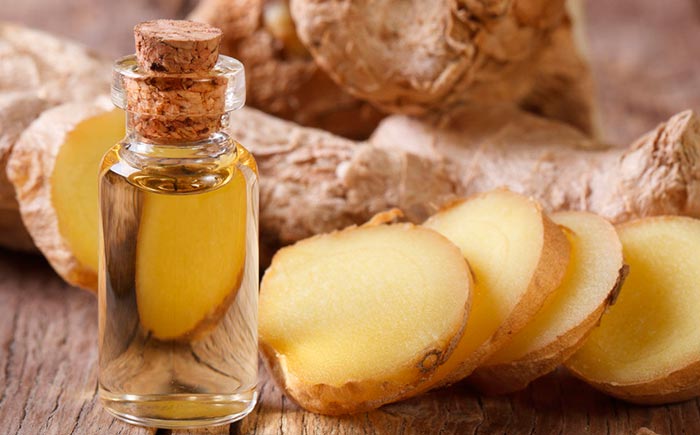
Undoubtedly, ginger is a tasty and very healthy product, but only in cases where there are no contraindications or allergies to it. Therefore, if the body reacts negatively, it is necessary to refuse it, because this can lead to irreparable consequences for health.
Did you like the article? Like ♥, subscribe to our channel and you will be one of the first to know about new publications!
And if you have something to share, leave your comments! Your feedback is very important to us!
Treatment and prevention of allergies
Drug treatment methods involve the use of various antihistamines. All antihistamines are usually divided into three generations. The first of them is characterized by a large number of adverse reactions, which include drowsiness, abdominal pain, constipation, and problems with urination.
Second- and third-generation antihistamines do not have a negative effect on the central nervous system and, in general, have a minimal number of side effects. When prescribing this or that drug, the doctor must take into account the presence of concomitant diseases, pregnancy or lactation. Here are the most common antihistamines.
- 1st generation - Suprastin, Diphenhydramine, Diazolin.
- 2nd generation - Claridol, Claritin, Rupafin.
- 3rd generation - Trexil, Zyrtec.
With increased lacrimation and runny nose, drops such as Cromoglin, Thaleum or Intal help. These drugs, based on cromoglicic acid, can quickly suppress unpleasant symptoms associated with inflammation of the mucous membranes.
A good addition to antihistamine therapy are enterosorbents, which help remove substances that trigger allergies from the body.
These include:
- Enterosgel,
- Smecta,
- Polysorb,
- Atoxyl.
Treatment of allergies to ginger with folk remedies
There are several effective remedies that have been proven over the years. Despite this, it is necessary to remember that self-medication can have unintended consequences.
Dermatitis, urticaria, eczema
Among the folk remedies for the treatment of allergic dermatitis, a decoction of oak bark is well suited. It is used for washing skin areas, as well as in the form of compresses. One teaspoon of bark is poured into a glass of boiled water. Cook in a water bath for half an hour. The shelf life of this decoction is two days. Rosehip oil extract is also used for compresses on affected areas of the skin.
Celery juice (0.5 teaspoon 30 minutes before meals) helps quite well against hives
To treat allergic eczema, use a leaf of white cabbage (a fresh, pre-washed leaf is tied to the affected areas for 2-3 days, then it is replaced with a new one). Fresh birch sap also helps as a lotion.
For eyes
For inflammation of the eye mucosa, rinsing with chamomile decoction is recommended. To prepare the decoction, pour a teaspoon of inflorescences into a glass of boiling water and let it brew for 10-15 minutes. Dropping raw beet juice into your nose will help get rid of allergic rhinitis.
A good method is to inhale the smoke from onion peels several times a day. Before using folk remedies, you should make sure that you are not allergic to any of them.
Prevention
The best preventative measure is the complete exclusion (elimination) of ginger from the diet: both in its pure form and as an additive to various dishes.
If ginger is a confirmed allergen for you, then you need to monitor its presence in cosmetics and hygiene products.
Causes
There are only three factors that cause the disease.
- Genetic. In this case, the disease is transmitted to a person even before birth and is fixed in the genes. It is enough for a person to eat one gram of ginger, and the disease attacks.
- Quantitative. This factor is that sometimes the body is not able to cope with large amounts of ginger - it simply does not have enough enzymes to digest it. Then the above symptoms appear.
- The reason may be the incompatibility of ginger with other substances taken in food at the same time as it. It is often used as an accompanying seasoning for other products: marinades, fish, etc. The substances they contain easily react with plant components and lead to allergies.
Interesting! Most often, signs of pathology appear in children. Their symptoms are more acute, and the disease takes a more severe course. This is due to the fact that the child’s body is not yet strong enough to resist the disease.
Predisposing factors
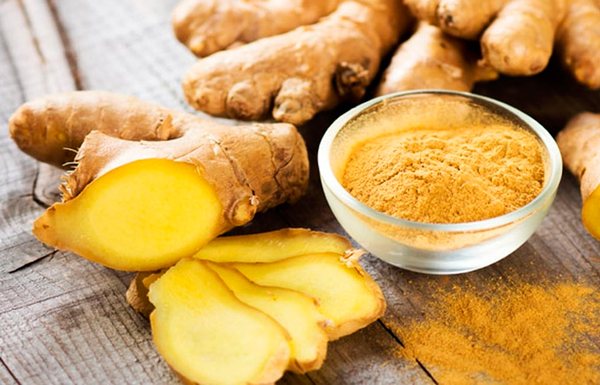
The main factor in the development of allergic processes in the human body is hereditary predisposition. Many antibodies present in the body of a pregnant woman are inherited by the fetus.
Secondary factors are climatic conditions, human habitat and environmental influences. Living in a large metropolis often has a detrimental effect on people's health due to environmental pollution.
In many cases, allergies are caused by poor lifestyle choices. Bad habits, passive rest and poor nutrition have a direct impact on human health. Reduced immunity provokes the appearance of allergic reactions to external irritants.
Adviсe
Treatment of allergies must certainly occur under the direct supervision of the attending physician. Self-administration of medications and folk remedies is fraught with the development of serious consequences.
Important! If you suspect a food allergy, you should call an ambulance. A correct diagnosis by a doctor will speed up recovery and prevent possible health problems.
People suffering from various manifestations of food allergies must be careful about their daily diet. You shouldn't play games with your body and hope for a miracle. Follow the diet recommended by your allergist and do not eat prohibited foods. Health is more important than any sweets and spices.
conclusions

Treatment of food allergies to ginger and other foods should be carried out under medical supervision. Visit a medical facility in a timely manner and follow the doctor's instructions. Your well-being and future life depend on it.
An allergy to ginger can manifest itself as a cross-reaction to components of dishes to which the plant is added. If you notice any symptoms, get tested for your body's sensitivity to food additives and eliminate foods that cause an allergic reaction from your diet.
FAQ
It is possible if a mother who is breastfeeding her baby drank tea with ginger or a ginger drink (the allergy manifests itself in the form of an itchy skin rash). For this reason, the mother needs to use ginger with caution, monitoring the baby’s behavior. If a skin rash appears, the nursing mother will have to give up ginger root.
Children under 2 years of age should not consume ginger drinks or dishes containing ginger.
If you are allergic to ginger root, you should stop using it. You should also avoid dishes that contain ginger in one form or another. Antihistamines can help relieve allergy symptoms.
Nasal and eye drops based on cromoglicic acid will relieve allergic rhinitis and conjunctivitis. For severe skin damage, corticosteroid ointments prescribed by a doctor help.
Symptoms
If a person is susceptible to ginger, then he may experience the following symptoms of this disease. First of all, after eating ginger in the mouth, pockets of inflammation and itching appear on the mucous membrane. Red spots also become noticeable on the face. The tongue and throat swell. This is an alarming symptom because a person may feel short of air.
As with many other types of allergies, when a patient reacts to ginger, they experience a runny nose, nasal congestion, and sneezing.
Since an inflammatory process and swelling develop in the throat, this leads to a dry cough and soreness, which annoy the patient and worsen his condition. Hoarseness appears in the voice.
Gradually the symptoms increase. It looks like this: rashes appear in places on the patient’s skin. Toxins are released through the pores of the skin, which causes irritation and severe itching.
If you continue to use ginger after the first symptoms appear, then the constantly irritated skin will turn into a field for dermatitis or eczema. And these are diseases that are much more difficult to cope with.
Since ginger is a food additive, an allergy to ginger can cause symptoms in the form of dyspeptic disorders, namely:
- nausea;
- vomiting;
- increased gas formation.
If a person has eaten a large amount of ginger, this can cause a serious complication - Quincke's edema. This is a life-threatening condition of a sick person, in which swelling spreads to:
If measures are not taken in a timely manner and the person is not helped with medication (which only doctors can do), he may suffocate and die. The important thing is that the development of these symptoms occurs at a high speed, and doctors are not always able to help the person in time. Therefore, when consuming products with ginger (for example, ginger tea or pickled ginger), you need to be careful (the portion should be small) and monitor your condition.
If ginger is proven to be allergenic, it should be excluded from the menu. Laboratory testing (blood analysis and skin tests) provides accurate data on the reaction to ginger.
If the allergen is an unknown product, you need to carefully monitor everything that a person eats, especially for the first time. Blood tests and tests also identify other foods that cause specific reactions in the body.




